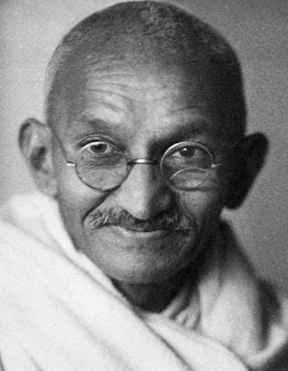On this date in 1869, Mohandas Karamchand Gandhi was born. The Indian independence leader and exponent of nonviolence was a devout Hindu himself but believed that religion was a personal matter and that the state should be nonpartisan in religious affairs. The fact that India is a constitutionally secular country is in no small part due to him (and his protege Jawaharlal Nehru).
Gandhi’s father was the chief minister of a small princely state in western India. His mother belonged to a syncretic sect that combined Hindu and Muslim practices. After an indifferent academic record, Gandhi went to England for his legal studies. Shortly after he returned to India, he embarked for South Africa at the invitation of a merchant there.
It was in South Africa that he first honed his skills at nonviolent protest (which he termed satyagraha or truth force), insisting that the British government repeal discriminatory laws targeting the Indian community. The honorific Mahatma (from Sanskrit, meaning great-souled or venerable), was first applied to him there in 1914. By the time he returned to India in 1915 after a 21-year stay in South Africa, his reputation was firmly established.
Gandhi spent the rest of his life leading the struggle to liberate India from British rule. He simultaneously spearheaded several social movements, such as for Hindu-Muslim cooperation and to free oppressed Hindu communities (the Dalits) from upper-caste persecution.
He also advocated for simple living and the use of homespun and locally produced goods (swadeshi). Much to his regret, India was partitioned along religious lines upon independence, eventually creating the current nations of India, Pakistan and Bangladesh.
Gandhi was assassinated by a Hindu nationalist, Nathuram Godse, who thought him to be too conciliatory toward Indian Muslims and Pakistan. His ideas have reverberated around the world in the decades since his death, with his admirers ranging from Martin Luther King Jr. and Cesar Chavez (both of whom adopted his nonviolent strategies) to Albert Einstein and Nelson Mandela. The United Nations General Assembly has declared his birthday as International Day of Nonviolence.
Gandhi tried all his life to reconcile his personal religiosity with the notion of a secular state. Although there has been some debate among scholars as to what exactly he was aiming for in the public sphere, “there can be no doubt that he would have found the idea of a Hindu rashtra (nation) utterly repugnant,” according to Vinay Lal, a UCLA professor.
His efforts to make India into a country that would tolerate all religions and even nonreligion (as his atheist friend Gora was a testament to) cost him his life. (D. 1948)
PHOTO: Gandhi in London in 1931.


